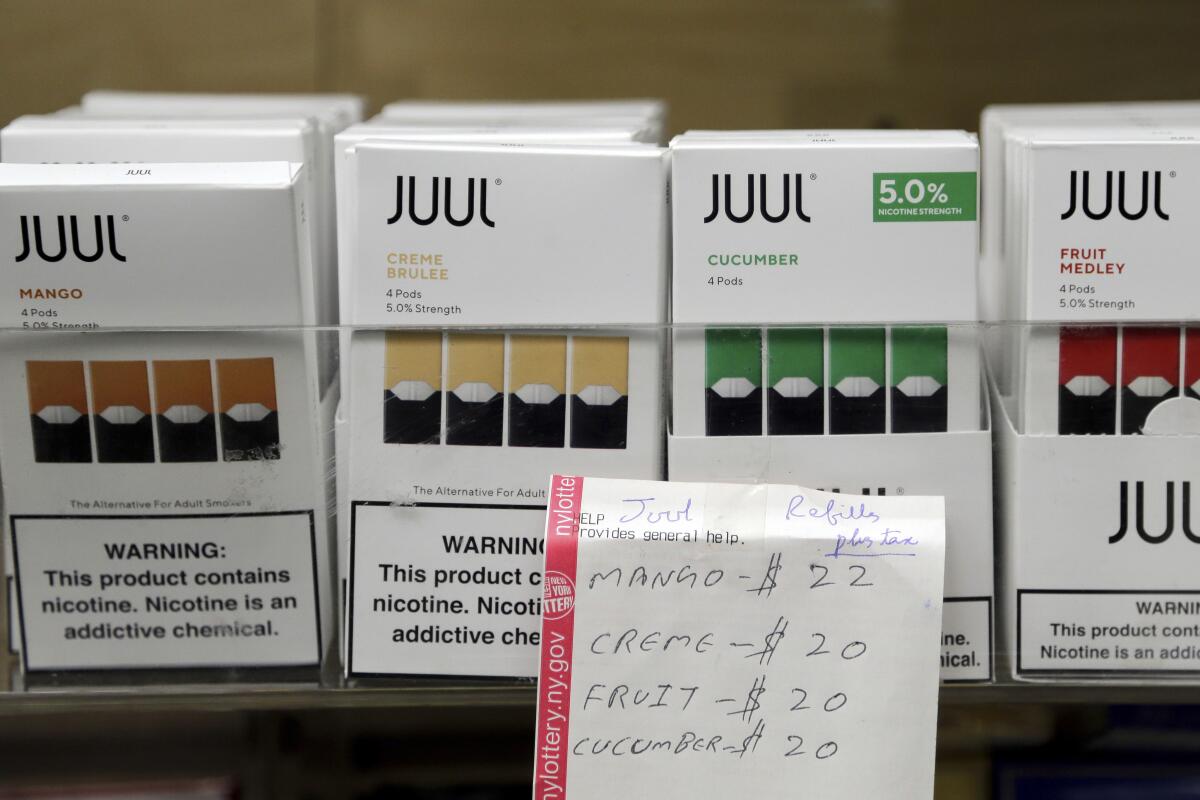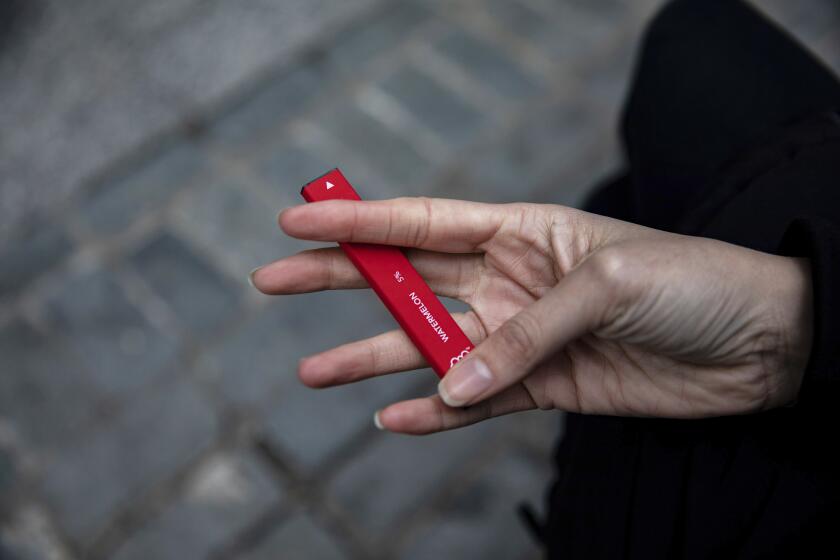Juul agrees to major settlement with six states; California will get $175.8 million

- Share via
NEW YORK — Beleaguered electronic-cigarette maker Juul Labs Inc. will pay $462 million to six states and the District of Columbia, the largest settlement the company has reached so far for its role in the youth vaping surge, state attorneys general said Wednesday.
The agreement with California, Colorado, Illinois, Massachusetts, New Mexico, New York and Washington, D.C., marks the latest in a string of recent legal settlements Juul has reached across the country with cities and states.
California will receive $175.8 million of the settlement amount, the largest payout agreement any state has reached with Juul, state Atty. Gen. Rob Bonta said. Among the lawsuits resolved by the settlement is one filed by the California Department of Justice, Los Angeles County and its district attorney’s office, which accused Juul of violating state laws and regulations on minors’ privacy rights, unfair competition and false advertising.
The vaping company, which has laid off hundreds of employees, will pay $7.9 million to settle a lawsuit alleging the company violated West Virginia’s Consumer Credit and Protection Act by marketing its products to underage users, the state’s attorney general, Patrick Morrisey, announced Monday. Last month, the company paid Chicago $23.8 million to settle a lawsuit.
Minnesota’s case against Juul went to trial last month with the state’s attorney general, Keith Ellison, asserting that the company “baited, deceived and addicted a whole new generation of kids after Minnesotans slashed youth smoking rates down to the lowest level in a generation.”
The latest government study on teen vaping suggests there’s been little progress in keeping e-cigarettes out of kids’ hands.
Like some other settlements reached by Juul, this latest agreement includes restrictions on the marketing, sale and distribution of the Washington, D.C., company’s vaping products. For example, it is barred from any direct or indirect marketing that targets youths, which includes anyone under age 35. Juul is also required to limit the amount of purchases customers can make in retail stores and online.
“Juul lit a nationwide public health crisis by putting addictive products in the hands of minors and convincing them that it’s harmless,” New York Atty. Gen. Letitia James said in a statement. “Today they are paying the price for the harm they caused.”
James said the $112.7 million due to New York will pay for underage smoking abatement programs across the state.
California will use its payout to help fund research, education and enforcement efforts to “abate and prevent the harms of e-cigarettes and nicotine addiction,” Bonta said in a statement.
“By using advertising and marketing strategies to lure young people to its products, Juul put the health and safety of its vulnerable targets and the California public at risk,” Bonta said. “Today’s settlement holds Juul accountable for its actions and puts a stop to its harmful business practices.”
District of Columbia Atty. Gen. Brian Schwalb said in a statement that Juul “knew how addictive and dangerous its products were and actively tried to cover up that medical truth.”
A spokesperson for Juul said that with Wednesday’s settlement, “we are nearing total resolution of the company’s historical legal challenges and securing certainty for our future.”
High school students stress one aspect of the “youth mental health crisis” is the pressure they feel to be perfect and successful so they can get into choice colleges.
The spokesperson added that underage use of Juul products has declined by 95% since 2019, based on the National Youth Tobacco Survey. According to the Centers for Disease Control and Prevention, though, because surveys were administered online instead of on school campuses during the pandemic, the results cannot be compared with prior years’ findings.
In September, Juul agreed to pay nearly $440 million over six to 10 years to settle a two-year investigation by 33 states into the marketing of its high-nicotine vaping products to young people. That settlement amounted to about 25% of Juul’s U.S. sales of $1.9 billion in 2021.
Three months later, the company said it had secured an equity investment to settle thousands of lawsuits over its e-cigarettes brought by individuals and families of Juul users, school districts, city governments and Native American tribes.
Juul rocketed to the top of the U.S. vaping market about five years ago with the popularity of flavors such as mango, mint and crème brûlée. But the startup’s rise was fueled by use among teenagers, some of whom became hooked on Juul’s high-nicotine pods.
Parents, school administrators and politicians have largely blamed the company for a surge in underage vaping.
More to Read
Sign up for Essential California
The most important California stories and recommendations in your inbox every morning.
You may occasionally receive promotional content from the Los Angeles Times.















